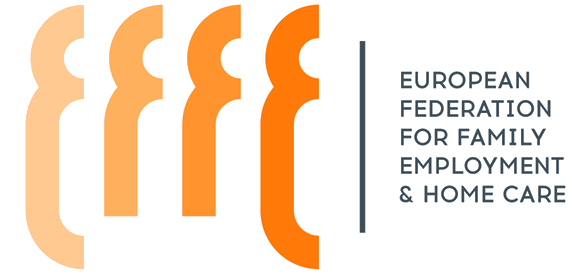
Social care is all too often undervalued and overlooked despite widespread understanding that Europe’s population continues to age, with around 30% estimated to be 65 or over by 2050. The 2024 European Elections represent an opportunity to change this and give the sector well-deserved recognition.
The European Federation for Family Employment and Home Care (EFFE) is one of the key actors that advocates for the home care sector at EU level – focusing on the direct employment model. In this model, the person in the need of care or domestic activities signs a contract with an individual domestic worker – helping them to maintain their agency and autonomy for as long as they wish via home care, or achieve work-life balance with professional support.
In spite of the value domestic workers bring to the lives of those they care for and to society as a whole, they experience a lack of recognition and support from European public authorities. In many Member States, they are left in legal limbo – often resorting to undeclared work – and lack the social and health rights all workers are entitled to. These are the hardworking people who look after young children, elderly people, and people with disabilities, allowing them to exercise their independence and take part in the daily life of their communities, and support women to return to the workplace by alleviating the burden of household tasks that fall on their shoulders.
Our vision of a social Europe is one where each and every citizen can choose the care model that best supports them to go about their daily lives. This matters for so many Europeans – from the elderly person seeking to stay safely in their own home, to students with disabilities looking for someone to help them get ready for university, and parents looking for a childcare worker they can trust.
This requires urgent reform to promote and enforce fair, decent, and formally regulated working conditions in the sector. A worrying number of home carers still face precarious undeclared work – estimated at over 45% in Germany, over 40% in Italy and between 28% and 40% in the Netherlands. By incentivising formal home care work, as is the case in countries like France and Belgium, employees can benefit from participation in the formal economy and access social protections previously denied to them.
Presently, home care workers experience a lack of official recognition and support. These employees, the majority of whom are women and who often have a migration background, are all too often overlooked by decision makers. Their experiences are neglected in public policy – creating a vicious cycle where there is a lack of research into the challenges faced by home care workers, and campaigners for change are met with yet another hurdle – the absence of quantifiable data to reinforce these women’s stories and experiences. Without such data, decision-makers are reluctant to take action.
However, such action on reforming the home care sector – providing all home care actors with the recognition and resources they need – has the potential to transform it for the better. Improving working conditions and training will attract more people to help meet growing demand for care and support, as well as giving Europeans the chance to access affordable, high-quality care from someone they trust.
Eight steps to supporting domestic services:
A social Europe that works for every home